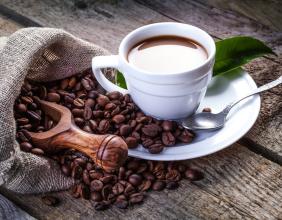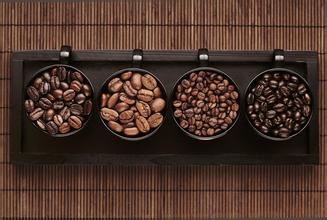Introduction to the characteristics, Flavor description and quality of Iron pickup and Arabica Coffee beans
Introduction to Iron pickup Coffee
Now this pure old variety of coffee has been growing for seven months, and by next year, these seedlings can be provided to villagers in three nearby villages for planting free of charge. At that time, for every mu of coffee trees that survive, the villagers will be subsidized to plant 500 yuan to promote the development of the ancient coffee industry and let the descendants of the ancient coffee trees reproduce from generation to generation. For this, Qi Fenghua is also full of confidence in leading the villagers to increase their income and become rich.
I am very happy to receive samples of purebred iron pickup coffee from Baoshan, Yunnan Province around February 10, 2009.
For the first time in so many years, I have received such a pure tin card to grow coffee raw beans.
Generally speaking, the iron card mentioned by Yunnan Ka Nong is often a mixture of new and old varieties.
Including today, I also received a sample of iron pickup coffee from Xishuangbanna. When I opened it, I found it very questionable.
Call Simao Coffee Company, which sent the sample, to confirm that she can't say clearly.
I asked her: then how did you tell me it was a tin card? She said it was from Canon.
I asked what the basis was: she said that Cajun said the top leaves of coffee trees were red. Although looking at the bean shape, she also feels very doubtful.
Three samples of Yunnan coffee were baked this time.
Now upload the photos of the baked iron pickup truck samples:
The water content of this iron card raw bean sample is as high as 15%.
Has changed color.
Use 200g~650g 's sample roaster to bake
Because the water content exceeds the standard, the dehydration time is prolonged, and the total baking time is 24 minutes.
541g cooked beans / 650g raw beans = 83.2%
Unfortunately, among the three Yunnan coffee sample cups tested today, this tin truck performed the worst, which made me very sad.
Perhaps China is the only country in the world, which not only produces coffee, but also has a huge potential consumer market. Today, Pu'er, the millennium tea village in Yunnan, has been called the coffee capital of China.
So Hong Kong resident Alex made Yunnan Coffee Cup 3A in a coffee shop in Kunming, which, like cappuccino, latte and espresso, uses only Pu'er coffee beans.
Jin Jihui, a Beijing native, has also opened a coffee shop in Pu'er. He plans to open another coffee movie theme restaurant and contract 3000 mu of land for coffee plantation in Ning'er County of Pu'er.
Hute, the agricultural manager of Nestl é, will need to buy more Yunnan coffee beans. During his tenure, Nestl é has used the Pu'er coffee beans he bought to develop a high-end gift box called "Yunnan Honor", which focuses on the Chinese market.
All this is because Pu'er, a thousand-year-old tea town in Yunnan, is now known as the coffee capital of China.
Chinese Coffee starts with Pu'er
In 2007, Jin Jihui, a middle-aged literary and artistic classmate with Jia Jingwen and Xu Jinglei at the Beijing Film Academy, came to Pu'er, a small border city in Yunnan. When he wanted to come here to spend his days doing Pu'er tea business, he was surprised to find that there were a large number of coffee trees here, which could satisfy his three major hobbies of coffee, red wine and movies at the same time, so he stayed in Pu'er and opened a COE cafe to start a new life and business.
Now Jin Jihui is busy doing two major things: one is to open a coffee movie theme hall, and the other is to "use the manor method to make coffee of the same quality as Blue Mountain" in the contracted coffee farm covering an area of 3000 mu.
In 2010, Hong Kong resident Alex also came to Yunnan. He is the most respected barista by the owner of the "breathing Cafe". Because there are excellent coffee trees in Pu'er, Yunnan Province, the boss opened the branch to Kunming. Alex flew to Kunming with the mission of launching the brand of the branch store.

Important Notice :
前街咖啡 FrontStreet Coffee has moved to new addredd:
FrontStreet Coffee Address: 315,Donghua East Road,GuangZhou
Tel:020 38364473
- Prev

Nutty Colombian Ramon coffee bean oil content how Italian coffee beans come from the origin of oil
Colombian coffee beans Colombia, beautiful mountains and rivers, beautiful scenery, pleasant climate, spring all year round, fresh air, refreshing. Colombia's mild climate, humid air, and diverse climate make it a harvest season all year round, with different kinds of coffee ripening at different times. What they grow is Arabica coffee beans of unique quality, which are ground from this coffee bean.
- Next

Taste characteristics of coffee bean producing area in Uganda quality introduction of manor flavor description method
Ugandan coffee beans introduced that in the 16th century, Portuguese colonists occupied coastal areas. In 1890, Germany and Britain divided East Africa, and Kenya was classified as Britain. The British government declared Kenya its "East African protectorate" in 1895 and changed it into its colony in 1920. Coffee was grown on large estates under British colonial rule, and the harvested beans were shipped to London for sale. Coffee Act of 1933
Related
- Detailed explanation of Jadeite planting Land in Panamanian Jadeite Manor introduction to the grading system of Jadeite competitive bidding, Red bid, Green bid and Rose Summer
- Story of Coffee planting in Brenka region of Costa Rica Stonehenge Manor anaerobic heavy honey treatment of flavor mouth
- What's on the barrel of Blue Mountain Coffee beans?
- Can American coffee also pull flowers? How to use hot American style to pull out a good-looking pattern?
- Can you make a cold extract with coffee beans? What is the right proportion for cold-extracted coffee formula?
- Indonesian PWN Gold Mandrine Coffee Origin Features Flavor How to Chong? Mandolin coffee is American.
- A brief introduction to the flavor characteristics of Brazilian yellow bourbon coffee beans
- What is the effect of different water quality on the flavor of cold-extracted coffee? What kind of water is best for brewing coffee?
- Why do you think of Rose Summer whenever you mention Panamanian coffee?
- Introduction to the characteristics of authentic blue mountain coffee bean producing areas? What is the CIB Coffee Authority in Jamaica?

